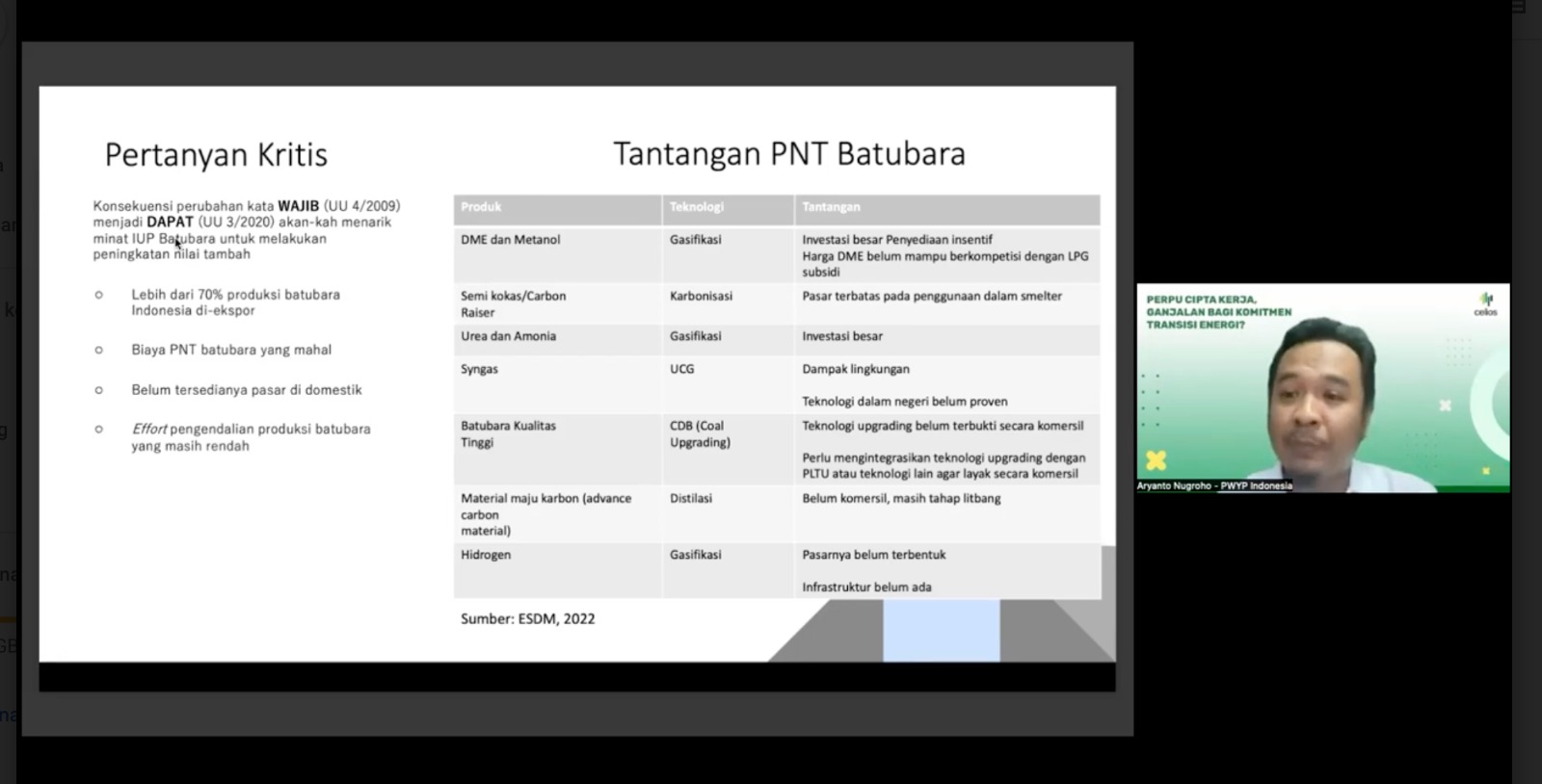Jakarta – The Government Regulation in lie of Law (PERPPU) on Job Creation, released some time ago by the Government, is considered to have various problematic articles. One part that raises concerns over adverse impacts on the economy, energy security, and the environment is Paragraph 5 of Article 128A, relating to changes in production fees/royalties for downstream coal products to zero percent.
To further examine the consequences of the enactment of the Job Creation Regulation, CELIOS (Center of Economic and Law Studies) has conducted a study and obtained various findings. The survey results were then presented at the CELIOS Media Briefing, held online on February 1, 2023. PWYP Indonesia’s National Coordinator, Aryanto Nugroho, and Tata Mustasya (Greenpeace Indonesia’s Climate and Energy Campaign Coordinator) became Responders in the media discussion hosted by Adhityani Putri (Executive Director, Yayasan Indonesia Cerah).
The study was presented directly by Bhima Yudhistira (Executive Director of CELIOS) and Muhammad Saleh (CELIOS Legal Researcher).
Bhima said that the 0% royalty policy for coal derivatives was a step backward in efforts to reduce carbon emissions. In addition to the losses experienced from the environmental side, CELIOS estimated the calculation of potential state losses due to the implementation of the 0% coal royalty.
“The Job Creation PERPPU hurts the transfer of revenue sharing funds to regions producing natural resources (SDA). 80% of non-tax state revenue (PNBP) royalties are transferred to producing regions at the provincial and district levels. More than 12 provinces and dozens of regencies still depend on their regional income from coal DBH,” said Bhima.
Bhima added that the presence of 0% royalty incentives for coal downstream makes banks tend to re-penetrate credit to the coal mining sector in the long run. As of November 2022, investment lending in the mining sector grew 74.2%, while working capital loans to the mining sector rose 31% annually. This situation will pose a risk of reducing the portion of lending to industries that are needed to accelerate the energy transition.
Meanwhile, Saleh said that in addition to Article 128A on 0% royalty changes for coal downstream, various articles are problematic, including Articles 2 and 3 do not adopt the principles of sustainable development; Article 38 paragraph (3) regulates forest borrowing for uncontrolled and highly centralized mining; Article 25 Reduces Community Involvement in the Preparation of EIA; Article 24 Changes in the Concept of EIA which is only the basis for the Feasibility Test, not the decision maker; Article 162 Repressive Norms for Mining Activists; Article 110A and Article 110B Elimination of violators of business licenses in forest areas; Article 18 Removed the adequacy of the minimum forest area of 30 percent; and Article 92, Article 35 and Article 292A There are no incentives and facilities for the business world to make a renewable energy transition.
On this occasion, Aryanto said that the policy of increasing the added value of the coal sector was still half-hearted. One of them is the change in the word MANDATORY to CAN for Mining Business License (IUP) and Special Mining Business License (IUPK) production operations that implement value-added improvements in Law Number 3 of 2020 (Minerba Law). In addition, Aryanto also said that the 0% royalty is also a privilege for IUPK holders of the continuation of the Coal Mining Concession Karaya Agreement (PKP2B) in addition to providing an extension for 10 (ten) years at each extension if they increase added value.
Author: Aryanto Nugroho
